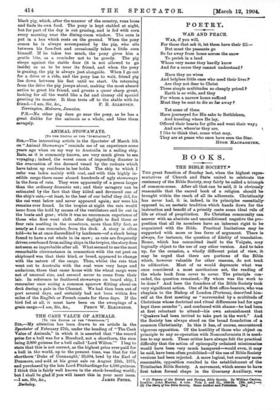Sin,—The interesting article in the Spectator of March 5th on
"Animal Stowaways" reminds me of an experience some years ago when on my way to Australia in a sailing ship. Rats, as it is commonly known, are very much given to sea voyaging ; indeed, the worst omen of impending disaster is the evacuation of the doomed vessel by the rodents which have taken up residence in her holds. The ship to which I refer was laden mainly with coal, and with this highly in- edible cargo there came aboard hundreds of ugly stowaways in the form of rats. They were apparently of a genus Larger than the ordinary domestic rat; and their savagery can be estimated by the fact that they killed and devoured one of the ship's cats,—at least, to the best of our belief they did, for the cat went below and never appeared again; nor were his remains ever found. In the tropics at night the rats would issue from the hold by means of the ventilators and lie out in the boats and gear; while it was no uncommon experience of those who first went aloft after daylight to find three or four rats nestling in the crosstrees, more than fifty feet, as nearly as I can remember, from the deck. A story is often told—to be at once discredited by landsmen—of a shark being found to have a rat whole in its maw ; as rats are frequently driven overboard from sailing ships in the tropics, the story does not seem so improbable after all. What seemed to me the most remarkable circumstance in connection with the rat pest on shipboard was that their kind, or breed, appeared to change with the nature of the cargo. Thus, whilst the rats that went out to Australia with the coal were very large and audacious, those that came home with the wheat cargo were not of unusual size, and seemed never to come from their lair. In reference to feathered stowaways on board ship, I remember once seeing a common sparrow flitting about on deck during a gale in the Channel. We had then been out of port several days, and certainly had not been within five miles of the English or French coasts for three days. If the bird fed at all, it must have been on the sweepings of a grain cargo.—I am, Sir, &c., PERCY W. ELKINGTON.
THE CASH VALUE OF ANIMALS.
[To THE EDITOR OF THE "SPECTATOR.']










































 Previous page
Previous page